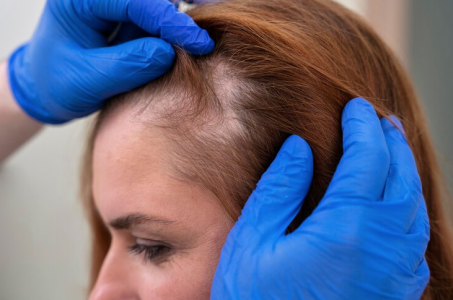Could your hair loss be more serious than you think? Doctors warn about often overlooked signs of autoimmune type of alopecia
By
VanessaC
- Replies 5
Disclaimer: This article cannot be considered as medical advice. Remember to consult with your doctor for a proper diagnosis.
Hair loss can happen for many reasons as we get older, from genetics to stress, but doctors are warning that an autoimmune type of alopecia is being overlooked and mistaken for normal ageing.
The condition is called frontal fibrosing alopecia (FFA), an autoimmune form of alopecia that affects both men and women. However, it is far more common in menopausal and post-menopausal women.
Alopecia, according to Healthdirect, means hair loss. There are also different types of alopecia, some can cause you to lose hair from a single area while other types can cause hair loss from several areas of your head, face, or body.
Catherine West, a 50-year-old from Queensland, is one such woman who unexpectedly received a diagnosis of FFA after visiting a dermatologist for a simple mole check.
She previously noticed severe hair loss across her entire body, and Catherine consulted her doctor, yet he dismissed her concerns and instead told her that she was simply experiencing the effects of ageing.
This prompted her to quickly brush off her hair loss concerns.
FFA was first discovered in Australia in 1994. The illness was initially considered rare, however, more and more women are being diagnosed with the disease.
The disease often shows through loss of hair over the frontal area of the scalp such as the hairline, fringe, and sideburns. It may also affect the eyebrows.
Other symptoms of the condition include redness around the hairline, thinning of the hair one the temples, itching and eyebrow loss.
'Sometimes women can lose eyebrows before the hairline starts to recede,' Dr Yip said.
'Some women can lose eyelashes ... (and) their face can start to develop little bumps called papules.'
Dermatologist Dr Leona Yip said that the primary cause of FFA remains unknown. However, a few contributing factors such as have been identified such as genetics, hormones, lifestyle, and environmental factors may contribute to its development.
Unfortunately, there is no known cure for FFA, but treatment includes reduction of the inflammation of the hair follicles in an attempt to lessen damage and scarring on the hairline.
'Without treatment, we know that the hairline at the front goes further back by about 1cm every year,' Dr Yip added.
Furthermore, Dr Yip said that early diagnosis is key to effective treatment.
'Once the hair follicles are destroyed, there’s nothing we can do to salvage (them) and get hair regrowth,' she explained.
'That’s why it’s really important for those who think they have FFA to seek treatment early to stop that progression as much as possible.'
Ms West said that imagining what her hair might look like in the future was quite daunting. She also shared that the condition had a major effect on her self-confidence.
'It’s actually really hard to come to terms with because you look at it, and you think “women aren’t meant to be bold”,' she said.
'I made the mistake of, when I was first diagnosed, googling FFA and then seeing pictures and I can remember looking at them and having a moment (and thinking) “I’m gonna be ugly”.'
'It does a lot for your self-esteem.'
 Members, share this article with your family and friends to help raise awareness of the illness.
Members, share this article with your family and friends to help raise awareness of the illness.
Also, share your thoughts and comments on this story below!
Hair loss can happen for many reasons as we get older, from genetics to stress, but doctors are warning that an autoimmune type of alopecia is being overlooked and mistaken for normal ageing.
The condition is called frontal fibrosing alopecia (FFA), an autoimmune form of alopecia that affects both men and women. However, it is far more common in menopausal and post-menopausal women.
Alopecia, according to Healthdirect, means hair loss. There are also different types of alopecia, some can cause you to lose hair from a single area while other types can cause hair loss from several areas of your head, face, or body.
Catherine West, a 50-year-old from Queensland, is one such woman who unexpectedly received a diagnosis of FFA after visiting a dermatologist for a simple mole check.
She previously noticed severe hair loss across her entire body, and Catherine consulted her doctor, yet he dismissed her concerns and instead told her that she was simply experiencing the effects of ageing.
This prompted her to quickly brush off her hair loss concerns.
FFA was first discovered in Australia in 1994. The illness was initially considered rare, however, more and more women are being diagnosed with the disease.
The disease often shows through loss of hair over the frontal area of the scalp such as the hairline, fringe, and sideburns. It may also affect the eyebrows.
Other symptoms of the condition include redness around the hairline, thinning of the hair one the temples, itching and eyebrow loss.
'Sometimes women can lose eyebrows before the hairline starts to recede,' Dr Yip said.
'Some women can lose eyelashes ... (and) their face can start to develop little bumps called papules.'
Dermatologist Dr Leona Yip said that the primary cause of FFA remains unknown. However, a few contributing factors such as have been identified such as genetics, hormones, lifestyle, and environmental factors may contribute to its development.
Unfortunately, there is no known cure for FFA, but treatment includes reduction of the inflammation of the hair follicles in an attempt to lessen damage and scarring on the hairline.
'Without treatment, we know that the hairline at the front goes further back by about 1cm every year,' Dr Yip added.
Furthermore, Dr Yip said that early diagnosis is key to effective treatment.
'Once the hair follicles are destroyed, there’s nothing we can do to salvage (them) and get hair regrowth,' she explained.
'That’s why it’s really important for those who think they have FFA to seek treatment early to stop that progression as much as possible.'
Ms West said that imagining what her hair might look like in the future was quite daunting. She also shared that the condition had a major effect on her self-confidence.
'It’s actually really hard to come to terms with because you look at it, and you think “women aren’t meant to be bold”,' she said.
'I made the mistake of, when I was first diagnosed, googling FFA and then seeing pictures and I can remember looking at them and having a moment (and thinking) “I’m gonna be ugly”.'
'It does a lot for your self-esteem.'
Key Takeaways
- Australians are being urged to watch for symptoms of frontal fibrosing alopecia (FFA), a form of alopecia often dismissed as a part of ageing.
- FFA, first identified in Australia in 1994, is characterised by hair loss in the frontal area of the scalp and can also affect eyebrows.
- There is no cure for FFA, but treatment aims at reducing the inflammation of the hair follicles to decrease permanent damage and scarring of the hairline.
- Dermatologist Dr Leona Yip stresses the importance of an early diagnosis in order to prevent irreversible hair follicle damage.
Also, share your thoughts and comments on this story below!








